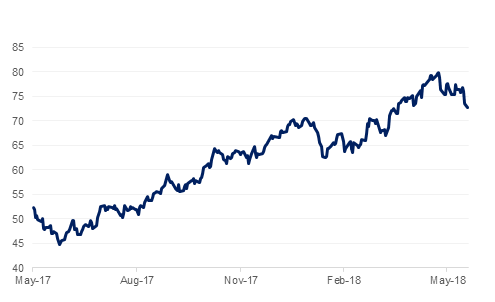
The United States approved tariffs on USD 50bn of imports from China on the grounds that China has long been stealing U.S. intellectual property. The specific products subject to tariffs of 25% include a list of 1,102 products, including aerospace, information and communications technology, robotics, industrial machinery, new materials, and automobiles. In retaliation, China also imposed additional duties of 25% on 659 American products. It is also likely to lodge a complaint with the World Trade Organization. This reduces the chance of a U.S.-China deal this summer. China appeared relatively open to offer concessions over the bilateral trade deficit, but is far less willing to compromise on industrial policy. On the other side, with the summit with North Korean leader Kim Jong Un now past, the argument that Trump needs Beijing's help to pressure Pyongyang is far less relevant. Though Congress is divided on tariffs, there is widespread support for the idea that the U.S. needs to take a tougher line with China.
On the data front, US economic data remained buoyant. University of Michigan’s measure of consumer confidence came in at a three-month high of 99.3 in June, from 98.0 previously and is indicative of strength of the labour market. The report also shows a further pick-up in households’ inflation expectations. One-year ahead expectations climbed to a three-year high of 2.9%, from 2.8%, echoing the acceleration in actual inflation.
The ECB announced plans to further taper down its asset purchase program. As per the latest decision, QE will be lowered to EUR 15bn a month after September and will be extinguished in December 2018. Interest rates will not be hiked before summer 2019. The ECB president adopted a cautious approach reflecting continued readiness and ability to do more if needed, even though economic forecast was optimistic in nature. The ECB’s macroeconomic projections reflect core inflation rising from 1.1% in 2018, 1.6% to 2019 and reach 1.9% by 2020 even though GDP growth is likely to slow in the years ahead.
OPEC’s scheduled meeting in Vienna this week is shaping up to be divisive. Saudi Arabia and Russia are inclined to agree lifting the output after the meeting, while Iran, Venezuela and Iraq are expected to be more reticent.

Treasuries ended the week mixed as a slight hawkish tilt by the Federal Reserve at its meeting was somewhat offset by ratcheting up of trade tension. The front end of the curve closed lower while the long end held steady. Yields on the 2y UST, 5y UST and 10y UST closed at 2.54% (+5 bps w-o-w), 2.79% (+2 bps w-o-w) and 2.92% (-2 bps w-o-w) respectively.
Regional bonds remained in a tight range as regional investors were away for Eid holidays. The YTW on the Bloomberg Barclays GCC Credit and High Yield index rose +1 bp w-o-w to 4.63% and credit spreads remained flat at 190 bps.
Over the course of last week, the Dollar Index rose 1.34% to reach 94.79, the highest weekly close since November 2017. Of technically significance is that once again, resistance was found at the 200 week moving average (95.04) which halted further gains. The upside threat is that a weekly close above this level can result in more significant gains towards the 76.4% one year Fibonacci retracement of 95.60. On the downside, declines may be initially halted by support at the 61.8% one year Fibonacci retracement (94.20) in the week ahead.
This morning, the NZD underperforms after coming under selling pressure amid trade war fears. As we go to print, NZDUSD is trading 0.17% lower at 0.69377 and looks primed to fall for a third day. We expect resistance at the 23.6% one year Fibonacci retracement at 0.6964 and support at 0.6872.
Asian equities are trading lower this morning as trade tensions continue to linger. The Shanghai Composite Index and the Nikkei index was trading -0.7% and -1.1% at the time of this writing.
Oil prices sank last week after a sizeable drop on Friday as the market increasingly price in Saudi Arabia and Russia increasing production. At the start of the week benchmark futures are on a soft footing with Brent already down around 1% at USD 72.76/b. China has also retaliated to the US imposing tariffs by threatening to place counter-tariffs on imports of US crude oil.
Investors dipped back into long positions last week as the recent selling helped to make long positions a less crowded trade. Net length in Brent rose by nearly 18k contracts while in WTI net length fell by around 2k lots. Spot price weakness is flattening time spreads but in both Brent and WTI they remain in backwardation for now.